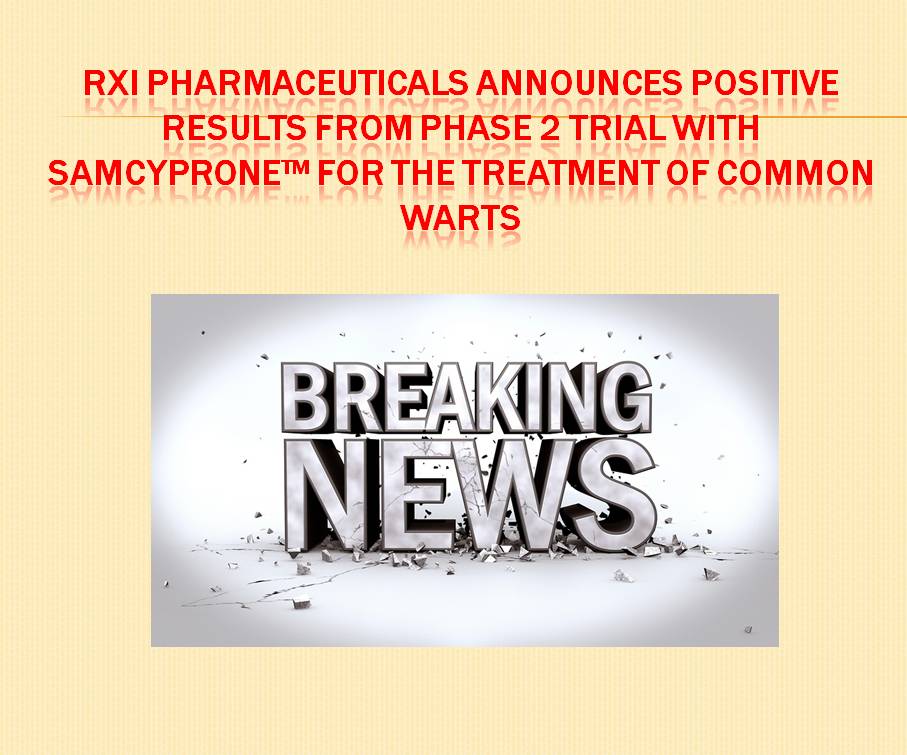
RXi Pharmaceuticals Corporation (NASDAQ: RXII) a biotechnology company developing the next generation of immuno-oncology therapeutics based on its proprietary self-delivering RNAi (sd-rxRNA®) therapeutic platform, today announced the positive results of its Phase 2 clinical trial, RXI-SCP-1502. This study evaluated the safety and effectiveness of Samcyprone™, a proprietary topical formulation of the small molecule diphenylcyclopropenone (DPCP), for the treatment of common warts.
The primary effectiveness objectives were met as shown by high levels of immunotherapeutic response and therapeutic response. The immunotherapeutic response rate – a prerequisite for therapeutic response – was 97.7% across all 88 subjects enrolled in the study. From a therapeutic response viewpoint, with once weekly dosing for up to 10 weeks, more than 70% of all warts showed a positive wart response rate, i.e. reduction of wart size of more than 50%. Complete wart clearance throughout the study was 54.0% for all warts, and up to 71.4% for certain wart types (non-plantar warts). The study results show furthermore that the product was safe and well tolerated.
Gerrit Dispersyn Dr. Med. Sc., RXi’s Chief Development Officer commented: “We are very pleased with these results, as they are a significant improvement over currently used treatment options. Based on published meta-analyses of randomized clinical studies, we know that the mean wart cure rate for placebo is around 23%, and it is not much higher for daily use of topical salicylic acid for 3 to 6 months, which is currently the recommended first-line therapy. In contrast, once weekly treatments with Samcyprone were used in our study, and of the warts that cleared, most did so within the first 10 weeks of treatment. Therefore, our results suggest better and faster results while requiring significantly fewer product applications. In addition, for salicylic acid treatments, it is recommended that lesions are abraded or pared down and/or soaked prior to application. In our Samcyprone study there was no such requirement for wart lesion preparation, which otherwise may have resulted in even better wart clearance rates. In addition to the key study objective, we collected a great amount of data that will help with the design of pivotal studies in support of Samcyprone’s future marketing applications.”
Dr. William Levis, Chairman of the Foundation for Global Skin Health Strategies and Consultant to the Laboratory of Investigative Dermatology at Rockefeller University added: “Compounded DPCP in acetone has been used for many years by dermatologists with demonstrated efficacy in numerous publications, but with highly variable results due to compounding variability and poor handling characteristics of the resulting solution. Based on the exciting study results with this new proprietary formulation of DPCP, I believe that Samcyprone will offer patients not only a powerful new treatment option, but also one that is more patient friendly than pharmacy compounded products and other currently used treatments that require more frequent applications and longer treatments.”
This study was a multi-center, multi-dose trial conducted in subjects with at least one cutaneous, plantar or periungual wart present for at least four weeks. In this Phase 2 trial, subjects were first treated with a sensitization dose on the inner arm and one or more preselected wart lesion(s). Once the sensitization response was confirmed, subjects continued with weekly treatments for up to 10 weeks, followed by an optional extension phase of up to another 10 weeks of weekly treatments. Two treatment cohorts were evaluated, the main difference between the cohorts was the amount of study product applied to the warts (more in Cohort 1). Wart clearance was evaluated based on wart measurements over time during the treatment period.